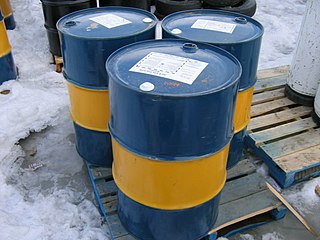
United Nations Security Council resolution 1284, adopted on 17 December 1999, after recalling previous relevant resolutions on Iraq, including resolutions 661 (1990), 687 (1991), 699 (1991), 707 (1991), 715 (1991), 986 (1995), 1051 (1996), 1153 (1998), 1175 (1998), 1242 (1999) and 1266 (1999), the council established the United Nations Monitoring, Verification and Inspection Commission (UNMOVIC) to replace the United Nations Special Commission (UNSCOM). It was the final resolution adopted in 1999.

United Nations Security Council resolution 1111, adopted unanimously on 4 June 1997, after recalling all previous resolutions on Iraq, including Resolution 986 (1995) which established the Oil-for-Food Programme, the council, acting under Chapter VII of the United Nations Charter, extended the provisions of that resolution relating to Iraqi oil sales for a further 180 days to meet the humanitarian needs of the Iraqi people.

United Nations Security Council resolution 706 decided on a mechanism to allow Iraq to sell oil in return for humanitarian aid from Member States. The council, acting under Chapter VII, adopted the resolution on 15 August 1991, after recalling resolutions 661 (1990), 686 (1991), 687 (1991), 688 (1991), 692 (1991), 699 (1991) and 705 (1991). The provisions of Resolution 706 functioned in a way similar to that which was later implemented in the Oil-for-Food Programme under Resolution 986 in 1995.

United Nations Security Council resolution 778, adopted on 2 October 1992, after recalling resolutions 687 (1991), 688 (1991), 692 (1991), 699 (1991), 706 (1991) and 712 (1991), the council, acting under Chapter VII, decided to authorise states holding funds from the sale of Iraqi petroleum to transfer funds to the escrow account under resolutions 706 and 712, of which 30 per cent would be transferred to the United Nations Compensation Commission.

United Nations Security Council resolution 1153, adopted unanimously on 20 February 1998, after recalling all previous resolutions on Iraq, including resolutions 986 (1995), 1111 (1997), 1129 (1997) and 1143 (1997) concerning the Oil-for-Food Programme, the council, acting under Chapter VII of the United Nations Charter, extended provisions relating to Iraqi oil sales for a further 180 days to meet the humanitarian needs of the Iraqi people and decided to permit the import of up to 5.256 billion United States dollars in Iraqi oil and oil products, up from the previous 2 billion.

United Nations Security Council resolution 1158, adopted unanimously on 25 March 1998, after recalling all previous resolutions on Iraq, including resolutions 986 (1995), 1111 (1997), 1129 (1997), 1143 (1997) and 1153 (1998) concerning the Oil-for-Food Programme, the council, acting under Chapter VII of the United Nations Charter, authorised the sale of up to 1.4 billion United States dollars of Iraqi oil and oil products within a 90-day period, beginning from 5 March 1998.

United Nations Security Council resolution 1175, adopted unanimously on 19 June 1998, after recalling all previous resolutions on Iraq, including resolutions 986 (1995), 1111 (1997), 1129 (1997), 1143 (1997), 1153 (1998) and 1158 (1998) concerning the Oil-for-Food Programme, the Council noted that Iraq was unable to export petroleum or petroleum products sufficient to produce US$5.256 billion worth of oil and authorised countries to provide Iraq with equipment to allow it to meet that sum.

United Nations Security Council resolution 1210 was adopted unanimously on 24 November 1998, after recalling all previous resolutions on Iraq, including resolutions 986 (1995), 1111 (1997), 1129 (1997), 1143 (1997), 1153 (1998) and 1175 (1998) concerning the Oil-for-Food Programme. The Council extended provisions relating to the export of Iraqi petroleum or petroleum products sufficient to produce US$5.256 billion worth of oil for a further 180 days.

United Nations Security Council resolution 1242, adopted unanimously on 21 May 1999, after recalling all previous resolutions on Iraq, including resolutions 986 (1995), 1111 (1997), 1129 (1997), 1143 (1997), 1153 (1998), 1175 (1998) and 1210 (1998) concerning the Oil-for-Food Programme, the Council extended provisions relating to the export of Iraqi petroleum or petroleum products sufficient to produce up to US$5.256 billion worth of oil for a further 180 days.

United Nations Security Council resolution 1281, adopted unanimously on 10 December 1999, after recalling all previous resolutions on Iraq, including resolutions 986 (1995), 1111 (1997), 1129 (1997), 1143 (1997), 1153 (1998), 1175 (1998), 1210 (1998), 1242 (1999), 1266 (1999), 1275 (1999) and 1280 (1999) concerning the Oil-for-Food Programme, the council extended provisions relating to the export of Iraqi petroleum or petroleum products sufficient to produce up to US$5.256 billion worth of oil for a further 180 days.

United Nations Security Council resolution 1302, adopted unanimously on 8 June 2000, after recalling all previous resolutions on Iraq, including resolutions 986 (1995), 1111 (1997), 1129 (1997), 1143 (1997), 1153 (1998), 1175 (1998), 1210 (1998), 1242 (1999), 1266 (1999), 1275 (1999), 1280 (1999), 1281 (1999) and 1293 (2000) concerning the Oil-for-Food Programme, the Council extended provisions relating to the export of Iraqi petroleum or petroleum products in return for humanitarian aid for a further 180 days.

United Nations Security Council resolution 1330, adopted unanimously on 5 December 2000, after recalling all previous resolutions on Iraq, including resolutions 986 (1995), 1111 (1997), 1129 (1997), 1143 (1997), 1153 (1998), 1175 (1998), 1210 (1998), 1242 (1999), 1266 (1999), 1275 (1999), 1280 (1999), 1281 (1999), 1293 (2000) and 1302 (2000) concerning the Oil-for-Food Programme, the Council extended provisions relating to the export of Iraqi petroleum or petroleum products in return for humanitarian aid for a further 180 days.

United Nations Security Council resolution 1352, adopted unanimously on 1 June 2001, after recalling all previous resolutions on Iraq, including resolutions 986 (1995), 1284 (1999) and 1330 (2000) concerning the Oil-for-Food Programme, the Council extended provisions relating to the export of Iraqi petroleum or petroleum products in return for humanitarian aid until 3 July 2001.

United Nations Security Council resolution 1360, adopted unanimously on 3 July 2001, after recalling all previous resolutions on Iraq, including resolutions 986 (1995), 1284 (1999), 1330 (2000) and 1352 (2001) concerning the Oil-for-Food Programme, the Council extended provisions relating to the export of Iraqi petroleum or petroleum products in return for humanitarian aid for a further 150 days.

United Nations Security Council resolution 1382, adopted unanimously on 29 November 2001, after recalling all previous resolutions on Iraq, including resolutions 986 (1995), 1284 (1999), 1352 (2001) and 1360 (2001) concerning the Oil-for-Food Programme, the Council extended provisions relating to the export of Iraqi petroleum or petroleum products in return for humanitarian aid for a further 180 days.

United Nations Security Council resolution 1409, adopted unanimously on 14 May 2002, after recalling all previous resolutions on Iraq, including resolutions 986 (1995), 1284 (1999), 1352 (2001), 1360 (2001) and 1382 (2001) concerning the Oil-for-Food Programme, the Council extended provisions relating to the export of Iraqi petroleum or petroleum products in return for humanitarian aid for a further 180 days and approved a list of revised sanctions against the country. Its adoption streamlined the sanctions program, with restrictions on shipping civilian goods to Iraq lifted though prohibitions on weapons and military goods remained.

United Nations Security Council resolution 1443, adopted unanimously on 25 November 2002, after recalling all previous resolutions on Iraq, including resolutions 986 (1995), 1284 (1999), 1352 (2001), 1360 (2001), 1382 (2001) and 1409 (2002) concerning the Oil-for-Food Programme. The council, acting under Chapter VII of the United Nations Charter, extended provisions relating to the export of Iraqi petroleum or petroleum products in return for humanitarian aid until 4 December 2002.

United Nations Security Council resolution 1447, adopted unanimously on 4 December 2002, after recalling all previous resolutions on Iraq, including resolutions 986 (1995), 1284 (1999), 1352 (2001), 1360 (2001), 1382 (2001) and 1409 (2002) concerning the Oil-for-Food Programme, the council, acting under Chapter VII of the United Nations Charter, extended provisions relating to the export of Iraqi petroleum or petroleum products in return for humanitarian aid for an additional 180 days.

United Nations Security Council resolution 1454, adopted on 30 December 2002, after recalling all previous resolutions on Iraq, including resolutions 661 (1991), 986 (1995), 1284 (1999), 1352 (2001), 1360 (2001), 1382 (2001), 1409 (2002) and 1447 (2002) concerning the Oil-for-Food Programme, the council adjusted the list of restricted goods and procedures for its implementation under the Oil-for-Food Programme. It was the final Security Council resolution adopted in 2002.

United Nations Security Council resolution 1472, adopted unanimously on 28 March 2003, after recalling all previous resolutions on Iraq, including resolutions 661 (1991), 986 (1995), 1409 (2002) and 1454 (2002) concerning the provision of humanitarian aid to the Iraqi people, the Council approved adjustments to the Oil-for-Food Programme giving the Secretary-General more authority to administer the programme for the following 45 days. The programme had been suspended when the Secretary-General ordered all United Nations staff out of Iraq days before the U.S.-led invasion.

















